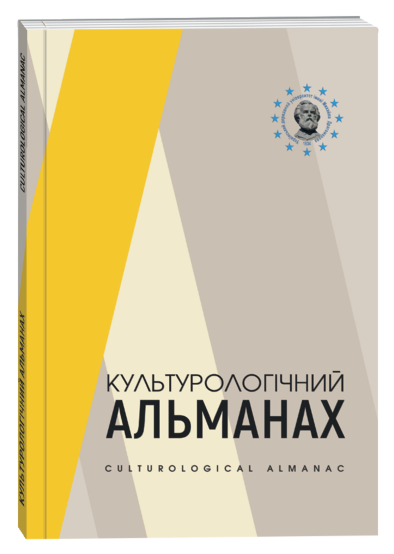A READING OF THE LINGUISTIC TURN THROUGH L. WITTGENSTEIN’S PHILOSOPHY
DOI:
https://doi.org/10.31392/cult.alm.2022.3.20Keywords:
L. Wittgenstein, the linguistic turn, communicative turn, representation, communication, reference theory of meaning, ordinary language, ideal language, relativism, language game, rules of language gameAbstract
The article examines the role and place of L. Wittgenstein’s ideas in the formation of the linguistic turn in philosophy in terms of representative and communicative dimensions. There are contradictions in the explanation of the history of the development of the linguistic turn, unlike in the analysis of another important intellectual event of European philosophy – the Copernican turn. Some researchers interpret the linguistic turn in a representative way, and some – in a communicative way. Nothing of the sort arises in the case of the analysis of the Copernican turn where everything is clear. According to the authors, this situation is due to the nature of the philosophy that had an impact on both events. In the first case, we are dealing with a clear and holistic concept of I. Kant, in the second – with two contradictory theories of L. Wittgenstein. In this interpretation, L. Wittgenstein appears as the main founder of the linguistic turn. This imposes an obligation on the authors to reveal the content of both of his fundamental books and to show their correspondence to the representative and communicative vector of the development of the linguistic turn. The main methods used in the research are historical-philosophical and structural-functional. The article is divided into four parts: 1) analysis of the history of interpretations of the development of the linguistic turn; 2) the metaphysical nature of L. Wittgenstein’s first book and the anti-metaphysical nature of the second; 3) the representative dimension in the “Tractatus Logico-Philosophicus”; 4) the communicative dimension in “Philosophical Investigations”. The authors concluded that the linguistic turn should be perceived as a holistic phenomenon, and the communicative turn following it can be considered as a convergence of trends laid down by L. Wittgenstein.
References
Аристотель. (1976). Соч. В 4-х т. / под ред. В.Ф. Асмуса. Москва : Мысль. Т. 1. 550 с.
Витгенштейн Л. (1994). Философские работы / пер. М.С. Козловой и Ю.А. Асеева. Москва : Издательство «Гнозио». Часть I. 612 с.
Грязнов А.Ф. (2010). Витгенштейн. Новая философская энциклопедия. В 4 томах / под ред. В.С. Степина. Минск : Мысль. Т. 1. С. 406–408.
Дэвид М. (2007). Корреспондентная теория истины. Эпистема. С. 147–177.
Мартиненко О.П. (2022). Ідеалістичні мотиви Логіко-філософського трактату Людвіга Вітґенштайна. Перспективи розвитку науки, освіти і технологій в контексті євроінтеграції : збірник тез доповідей міжнародної науково-практичної конференції, м. Кропивницький, 12 жовтня 2022 р. Кропивницький : ЦФЕНД. С. 62–63.
Мартиненко О.П. (2021). Синтез у статичному й динамічному аспектах в генології Парменіда та Геракліта. Людинознавчі студії: збірник наукових праць Дрогобицького державного педагогічного університету імені Івана Франка. Серія «Філософія». № 43. С. 89–95.
Медведев Н.В. (2018). О культурном релятивизме Л. Витгенштейна: Pro et contra. Манускрипт. №. 9(95). С. 71–75.
Можейко М.А. (2001). Пустой знак. Постмодернизм. Энциклопедия / под науч. ред и сост. А.А. Грицанова, М.А. Можейко. Минск : Интерпрессервис; Книжный Дом. С. 640–642.
Синиця А.С. (2017). Лінгвістичний поворот у філософії: критичний аналіз. Схід. № 2. С. 100–104.
Филиппович A.B. (2002). Лингвистический поворот История философии: Энциклопедия / сост. и глав. научный редактор А.А. Грицанов. Минск : Интерпрессервис; Книжный Дом. С. 552–553.
Филиппович A.B. (2002). Логико-философский трактат. История философии: Энциклопедия / сост. и глав. научный редактор А.А. Грицанов. Минск : Интерпрессервис; Книжный Дом. С. 559–566.
Филиппович A.B. (2002). Философские исследования … История философии: Энциклопедия / сост. и глав. научный редактор А.А. Грицанов. Минск : Интерпрессервис ; Книжный Дом. С. 1159–1169.
Bergmann G. (1960). Strawson’s Ontology. The Journal of Philosophy. Vol. 57, № 19. С. 601–622.
Rabaté J.-M. (2003). Introduction 2003: Are you History? J. Sturrock. Structuralism. Oxford, etc. : Blackwell Publishing. P. 1–16.
Strawson P.F. (1959). Individuals: An Essay in Descriptive Metaphysics. London : Methuen. 255 p.








